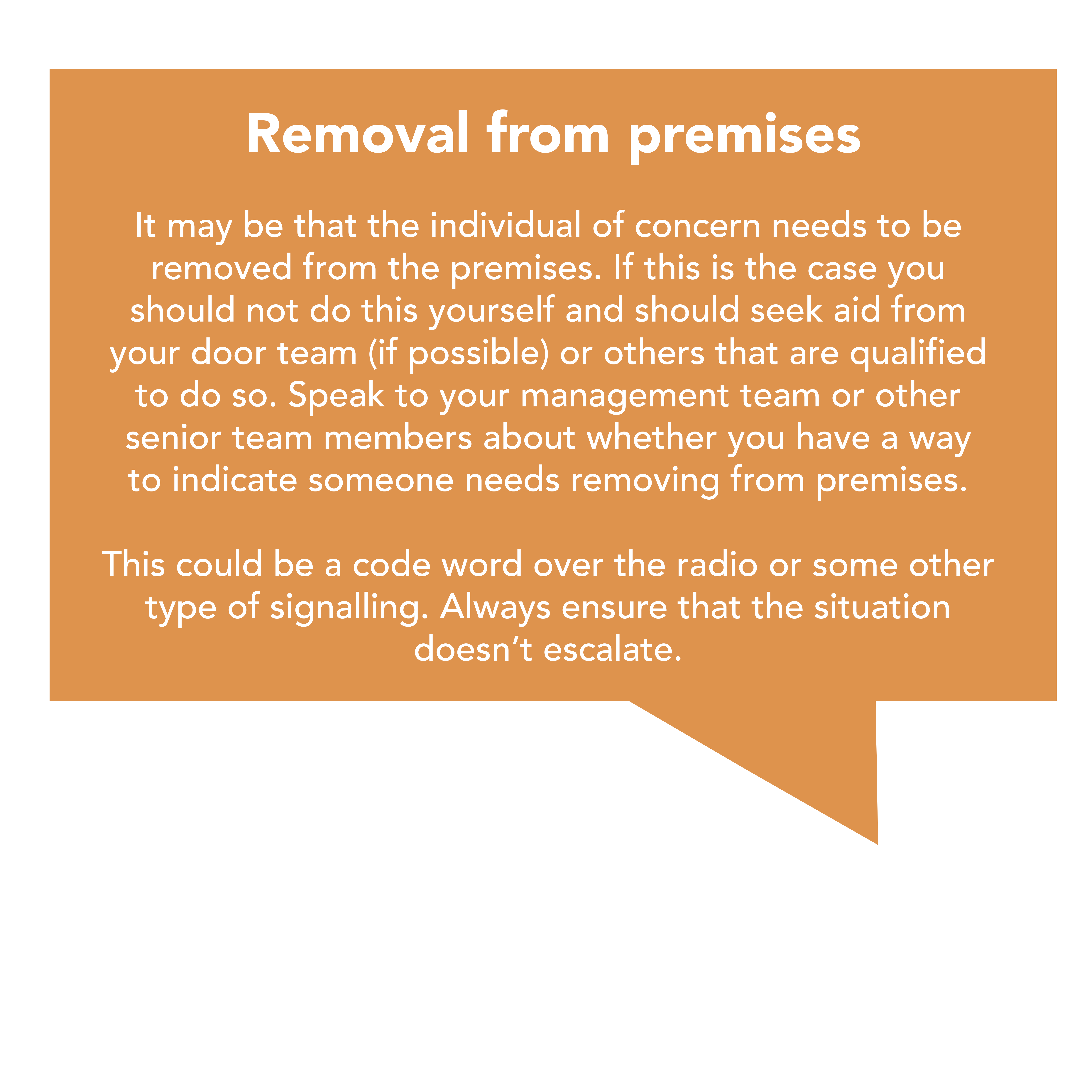
The following guidance is provided by askforangela.co.uk. You should also make yourself aware of your venue's Safeguarding policies and procedures.
Who, Why, How & When
People go for nights out for a number of different reasons. Understanding why people go out will help in understanding how they might become vulnerable while out.
Some reasons include:
- Circuit/pre-club
- Out on the town Chatting with friends
- Watching sports
- Local events
- Special meal out
- Pride
- Forget about their day
- Date night
VULNERABILITY:
From the list of occasions above, these are some examples of how people could become vulnerable and may need to ask for Angela:
| CIRCUMSTANCE | POSSIBLE VULNERABILITY |
|---|---|
| Circuit/pre-club | Pre-loading, excessive drinking |
| Out on the town | Lose their group of friends, not know where they’re going |
| Chatting to friends | Do they know everyone in the group, excessive drinking |
| Watching Sport | Heightened levels of anger and frustration, fighting |
| Local Events | Unable to get home, unwanted attention from others |
| Date Night | Do they know their date, is it the person they expected? |
| Special Meal Out | Heightened emotions, domestic abuse |
| Pride | Hate crime targeting |
| Forget about their day | Excessive drinking, looking to cause trouble, becoming a target |
One reason was specifically left out as they apply to all of these occasions – reports of spiking. Spiking reports have been highlighted on the national stage. A YouGov poll found that one in nine women and one in 17 men in the UK said they have been the victim of drink spiking. Further to this, the Alcohol Education Trust reported in a recent CAP 18-25 webinar that a survey of 23.000 university students by The Tab found that 11% had experienced spiking in their first term.
As a customer-facing member of the team it is important to remember that anyone can become vulnerable given different circumstances. No matter who asks for our help, we always need to listen and be prepared to C.A.R.E.



Good Practice
DOs
- Always complete an incident report including the date and time, brief description of the incident and action that was taken.
- Ask a female staff member to accompany you and the person asking for help to the safe location, this may help the person asking for help feel more comfortable and more willing to talk about the situation.
- When safe to do so, if a possible crime has been committed, preserve the crime scene.
- If possible, the safe location should be covered by CCTV or if you have access to body cams, make sure they are on.
- Make yourself aware of your venue's 'Calling the Emergency Services' policy
DON'Ts
- Do not leave the person asking for help alone, use your radio if you need to contact another member of staff for help or guidance.
- Do not allow the person asking for help to leave the venue in sight of the person causing them distress as this could lead to them being followed out of the venue and placed at higher risk.
- Do not put yourself in a vulnerable or dangerous situation.
C.A.R.E.
Now that you understand the role you need to play as an active listener, we’re going to look at the process when someone asks for Angela.
If someone comes into your venue and asks for Angela – we should C.A.R.E.:
Do they have friends with them?
Do they need additional support?
Has the situation got the potential to escalate?
A ctively listen:
Don’t jump to conclusions, they need to feel in control and get that power back. Pause, give them time to speak.
Listen carefully to what has been said.
Ask what course of action they would like to take.
R isk assess:
Look at the current environment, if the perpetrator is in a large group, do you need to get them away individually?
Don’t escalate the situation and put anyone at risk, including yourself.
Do you need to let a member of management know someone has asked for Angela?
Do you need to take them to your venue's safe space for them to sit in?
What course of action do they want to take?
E xplain/evaluate:
Explain what their possible next steps are - refer them to askforangela.co.uk to find support information if needed.
Evaluate your systems and policies, was there anything else you could’ve implemented? Share best practice with other team members

Staff Workbook
The Ask For Angela Campaign has provided a workbook for premises and anyone who works with customers that can become vulnerable. Although this is aimed primarily at alcohol licensed premises, this can also be adapted for any customer facing service.
The workbook is intended to guide venues through the process of setting up a robust Ask For Angela scheme and how to support anyone who finds themselves in a vulnerable situation.
The aims of the workbook are:
Understand and support anyone vulnerable who comes into your venue or premises Empower your team to feel equipped to support vulnerable people.Improve feelings of safety across night-time economy visitors.Improve customer experiences in the business.
This workbook can be done in your own time and can be used for your personal reference while at work.



